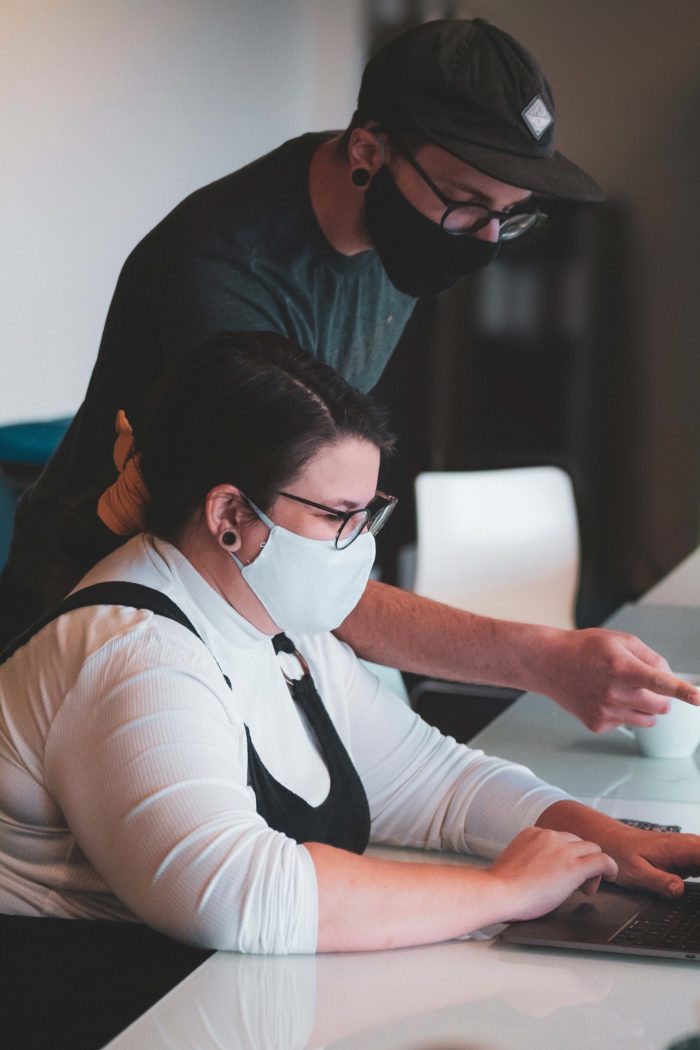What did the Olympics tell us about employees’ mental health?
 Everyone had an opinion on Simone Biles when she withdrew from most of her events at the Tokyo Games. But, despite her critics, most people were hugely supportive that she had the courage to say “no” when her mental and physical health needed a break.
Everyone had an opinion on Simone Biles when she withdrew from most of her events at the Tokyo Games. But, despite her critics, most people were hugely supportive that she had the courage to say “no” when her mental and physical health needed a break.
However, with a massive 51% of UK employees saying they feel the need to put on a brave face at work, even when they’re miserable or unwell, it’s clear that not everyone is as brave as Simone was. And it’s a big problem for our businesses, because employees are risking a significant negative impact on their mental health.
Along with that comes burnout, productivity loss, disengagement and increased staff turnover.
It’s time to ask yourself what lesson you could take away from the Olympics this year and how you could better support your staff to be more open and honest, when it comes to their mental and physical health?
If you don’t already have one in place, consider a wellness initiative to help create an approachable and understanding environment for your employees, and to demonstrate that yours is a business that really does care about its people.
Latest HR news
Are you guilty of underpaying employees?
 Almost 200 firms were named and shamed for underpaying minimum wage employees in August.
Almost 200 firms were named and shamed for underpaying minimum wage employees in August.
These companies were ordered to reimburse more than 34,000 employees who were underpaid, as well as being handed fines of more than £3.2million by HMRC. However, the majority of these underpayments were unintentional or had been corrected prior to the investigation.
But, with firms like Pret a Manger and John Lewis on the list, it shows that even big companies can be caught out by errors.
When was the last time you reviewed your staff pay to ensure that it was in line with labour laws? Do you take things, like uniform allowance and reimbursing expenses, into account? Should the Government offer more guidance and support to ensure businesses are paying staff correctly? And do you think it’s fair that businesses were named and shamed, even though many of the mistakes were corrected years ago? We’d love to hear your thoughts on this one.
Will we ever see a 5-day working week in the office again?
1 in 4 businesses say they intend to allow their staff to work from home for at least part of the week and almost 1 in 5 businesses said they could make this happen for most of their employees. This is a big rise when compared to life before March 2020, when only 17% of employees worked remotely.
However, 1 in 5 businesses said they would not allow any of their staff to work from home after restrictions are lifted.
These findings come as the Chancellor has urged employees to return to the office, after dropping the official working-from-home guidance.
Have you changed your policy on remote or flexible working? Will you move forward with a hybrid working policy, or are you keen to return to business as usual as quickly as possible?
48% of employees think that disclosing a mental health issue to their manager will affect their career progression.
While they’re more likely to discuss issues with their peers, it’s important that we’re creating supportive and trustworthy environments for our people and reassuring them that any disclosures will remain strictly confidential.
No jab, no job
Covid vaccinations will be made compulsory for all care home staff from 11th November. If this applies to your business, it’s important you communicate this message to all employees as soon as possible.
Story 2
Sexual harassment has evolved during Covid
– it could damage your business
 Despite many of us working from home over the past 18 months, sexual harassment at work has increased and taken on new guises. This has been linked to the increased use of messaging apps and video platforms, along with the more casual attitude that comes along with working from home.
Despite many of us working from home over the past 18 months, sexual harassment at work has increased and taken on new guises. This has been linked to the increased use of messaging apps and video platforms, along with the more casual attitude that comes along with working from home.
Examples of new forms of sexual harassment include taking screenshots and sharing them, making inappropriate comments or using suggestive or unprofessional emojis, or even a manager privately messaging employees in a personal capacity.
And while its upsetting for employees, it could also be damaging for business. If a firm stance isn’t taken from the off, it has the potential to cause high staff turnover, with requests for settlements or even claims of discrimination or unfair dismissal. The main difference between office-based sexual harassment and this new type of WFH sexual harassment is the opportunity to save evidence.
The Government is aiming to take a hard stance on this, forcing employers to act quickly and to take all reasonable steps to prevent harassment. One of the intentions is to make employers legally liable if employees are harassed by colleagues, or third parties like suppliers or customers. Is it enough?

Q&A – Most asked questions last month
How do I work out part-time holiday requests?
Part-time workers are entitled to 5.6 week’s paid holiday (statutory), but this should be worked out in proportion to the hours they work. If they work 3 days, that’s 16.8 days (3 x 5.6).
What do I do if I don’t want my team to work from home?
Following Government guidance on working safely during Covid-19, you’ll need to carry out new risk assessments to ensure safety procedures are in place. Then, let your staff know of the new changes with as much notice as possible.
An employee has sent me a grievance letter. What do I do?
Acknowledge it, take it seriously, and seek professional HR advice to avoid a potential risk for tribunals in the future. It can be complex, so never try and handle it without expert help.
Have workers on furlough? You’ll need to know how the furlough scheme is changing

In May, the Government announced the furlough scheme would be extended to 30th September 2021.
Both Boris and Rishi had said that there will be no further extensions, as it is the Government view that most workers will be able to return to work after ‘Freedom Day’ on the 19th July.
What do the new changes look like?
1) Workers will continue to receive 80% of their wages, up to a maximum of £2,500, until 30th September
2) From July 1st, you’ll need to pay 10% and the government will pay 70%
3) In August and September, you’ll need to pay 20% and the government will pay 60%
The furlough scheme has acted as a lifeline for many, saving jobs while businesses have either closed or run at a reduced capacity. The hospitality industry has been hit particularly hard, with large events like weddings cancelled or postponed, and there’s been a huge decline in travel.
Business groups have called to have the scheme extended for the hardest hit industries, to prevent job loss, but it now looks unlikely.
What happens when furlough ends?
You’ll need to pay 100% of your team’s wages and you’ll need to understand where that might leave you as a business.
If you’re at all worried about this, get in touch to discuss the options that are available to you.
Latest HR news
Do you offer ‘good’ work?
 The CIPD’s annual Good Work Index report was published last month. It found that job quality is falling short on several measures within the UK.
The CIPD’s annual Good Work Index report was published last month. It found that job quality is falling short on several measures within the UK.
A quarter of workers say that their work is bad for their physical or mental health. The same figure reported a poor work/life balance, with 30% of workers admitting to having an unmanageable workload.
As a result, employers are urged to act now to improve job quality.
What could you do to ensure job quality is good throughout your business?
- Make wellbeing high on your agenda
Do you have any wellbeing or mental health initiatives in your workplace? Would your employees be comfortable to come to you with a problem? How can you make it easier for them to do so?
- Monitor staff workloads
Are people taking on too much? What are the reasons for this? You should also consider whether everyone in the business has been given the same opportunity for development and progression. |
Changes to employment contracts
You must now give employees and workers the principal statement on the first day of their employment and the wider written statement within 2 months of the start of employment.
| The principal statement provides the employee with all of the contractual information about their employment, such as pay, hours of work and holiday entitlement.
The wider written statement includes information about pensions, non-compulsory training and disciplinary / grievance procedures. |
Do you have to give your employees time off to get their vaccine?
Although there is no legal obligation for your business to allow employees time off for medical appointments, the seriousness of the pandemic may mean that the implied term of trust and confidence is applicable. This applies to every term of contract and places an obligation on both employer and employee not to act in a way that would destroy or seriously damage the relationship.
As an employer, you have a duty of care to your employees and allowing them to be vaccinated could arguably fall under this category too, especially for people who are customer facing.
‘Microbreaks’ are down 95% since working from home
A new study claims that your team aren’t taking enough ‘microbreaks’ while working from home.
This can increase stress, make them less productive and be more prone to ‘burn-out’.
| Perhaps arrange a virtual break room? Or if you’re looking to encourage movement, perhaps set a team challenge – a group goal of walking or running 25 miles in a week, for example.
It’s also worth a quick reminder to your people of what breaks they should be taking each day, so they’re clear you actively encourage it! |
Returning to the office with a hybrid team?

Here are 4 things to get right:
It goes without saying that the pandemic has created the greatest workplace transformation of our lifetime, quickly changing the way you and your team work.
Even though the office has opened up again, you may decide to offer employees the choice to continue working from home, in the office, or a mixture of both – creating a new type of hybrid workforce.
Here are 4 tips to creating a successful hybrid workforce:
- Create a hybrid working policy
With any sort of change, there are always lots of unanswered questions. You’ll need to create a hybrid working policy to answer them. This is all about setting expectations to help protect you, your business and your relationship with your employees.
- Make sure you’re treating employees fairly
Make it clear to everyone that, although they may be working away from the office, they are still very much in your mind and will be considered for all of the usual things, such as projects, promotions, or additional roles as they would normally be.
- Rethink how you manage performance
Instead of measuring ‘time’ spent in the office, you may want to reconsider the metrics you’re using to measure employee performance. Use the following instead:
- Business outcomes
- Employee behaviours
- Important activities
- Focus on team happiness
Just because people are working away from the office, don’t forget to do the things that you would do if they were in the office. It’s not ‘out of sight, out of mind’. Check in with your team regularly. Make sure you have wellness or mental health initiatives in place and arrange social activities.
Your HR questions answered

Q: I now have part-time staff. How do I calculate their holiday entitlement?
A: Holiday allowances can be confusing when you have lots of staff all working different hours. Getting it wrong can make you look unprofessional, so we always recommend using good software. This allows you to enter individual hours and it works it all out for you. Better still, many programs let staff make requests for time off and keep track of remaining hours to take. There are lots of different ones available and many offer free trials.
Q: How do I get rid of someone who is underperforming?
A: Before you make any snap decisions, you should make sure you’ve given your employee the chance to improve. Work on performance management and let your employee know exactly what is expected of them. Create a new set of metrics that they must meet in order to improve and ensure they have access to any necessary training. If you still have a problem after these steps are taken, consult an HR professional to ensure you follow the correct procedures.
Q: An employee has just told me she’s pregnant. What do I need to do?
A: While this is great news, it does mean a little extra work for you. First and foremost, a positive reaction from you is vital. Get all of the necessary information, such as due date and expected maternity leave dates, as well as any antenatal appointments. You will need to undertake a health and safety assessment for your expectant employee to ensure working conditions are suitable. You should also ensure that they know your company’s maternity policy.
Do you need to talk to a HR consultant?
Do you have a potential HR problem that could easily get out of hand? Or could your HR support be more proactive?
We’d love to help. We’re currently taking on new clients so, if you think we might be a good fit, let’s arrange a call for an initial (no-obligation) chat. Simply call; 01709 640 013 or email; Hello@s3hr.co.uk to book an appointment.
Following the Prime Minister’s announcement regarding the national lockdown that’s due to be implemented Thursday 5th November, we wanted to reassure you that our HR Advisors, Employment Law experts and Health & Safety Consultants will be continuing to work throughout.
We will continue to extend our support to businesses outside of our own client base and we welcome any new enquiries – anything from an ongoing HR or employment law matter to supporting you with drafting a fit for purpose Job Support Scheme Agreement reflecting the latest governmental measures.
If you need to speak to any of our team concerning HR, Employment Law or Health & Safety matters, then please get in touch by either sending us an email with your name and enquiry to hello@s3hr.co.uk and one of our team will get back to you as soon as possible or alternatively you can call our office on 01709 640 013 and speak to any of our Advisors.
On a final note, we hope that you all manage to stay safe and well during this difficult and challenging time.
Daniel Yongo
Managing Director
Dear Valued Clients, Partners and Vendors
It is our pleasure to announce that we are expanding our business with a new office location.
The new office is located at Silkstone House, Pioneer Close, Rotherham, South Yorkshire, S63 7JZ. Please update your records with our new address. We will be moving on the 19th December and starting business at our new location on the 21st December, our phone numbers and email addresses will remain the same, as will our website address and social media accounts.
Our new facility offers us the opportunity to better serve our loyal clients and work more effectively with our valued business partners. We look forward to continuing to serve your needs and work with you at our new location.
We would like to take the opportunity to thank Stephen and Julia Hollings of My Head Office in Rotherham where we are currently located for being fantastic landlords over the last 2 years. We are sorry to be leaving but excited for the next step in our journey.
Should you have any questions or queries then please don’t hesitate to call or email us.
Yours sincerely
Daniel Yongo
Managing Director
 Everyone had an opinion on Simone Biles when she withdrew from most of her events at the Tokyo Games. But, despite her critics, most people were hugely supportive that she had the courage to say “no” when her mental and physical health needed a break.
Everyone had an opinion on Simone Biles when she withdrew from most of her events at the Tokyo Games. But, despite her critics, most people were hugely supportive that she had the courage to say “no” when her mental and physical health needed a break.  Almost 200 firms were named and shamed for underpaying minimum wage employees in August.
Almost 200 firms were named and shamed for underpaying minimum wage employees in August.  Despite many of us working from home over the past 18 months, sexual harassment at work has increased and taken on new guises. This has been linked to the increased use of messaging apps and video platforms, along with the more casual attitude that comes along with working from home.
Despite many of us working from home over the past 18 months, sexual harassment at work has increased and taken on new guises. This has been linked to the increased use of messaging apps and video platforms, along with the more casual attitude that comes along with working from home. 


 The CIPD’s annual Good Work Index report was published last month. It found that job quality is falling short on several measures within the UK.
The CIPD’s annual Good Work Index report was published last month. It found that job quality is falling short on several measures within the UK.

